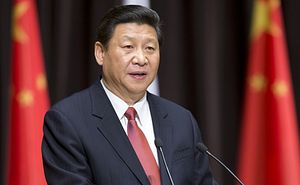With continuing strategic insecurities and distrust between China and the U.S., Xi Jinping’s “China Dream” has been described by a number of Western analysts (including here at The Diplomat) as China’s plan to challenge U.S. primacy in and across the Asia-Pacific region.
This is an issue that requires more discussion. First of all, what is the “China Dream?” The “China Dream” does not imply that the Chinese are trying to sell a universal political or ideological product to the world. Rather, it refers to Chinese people’s exploration of their own developmental model and their longing for a “great rejuvenation” of the Chinese nation. This will be a very long process, especially without any historical precedents. As Eric X. Li put it in his TED talk, “The significance of China’s example is not that it provides an alternative, but the demonstration that alternatives exist.” China is not attempting to force other countries to follow its unique developmental model.
Therefore, China will not, and does not have to, directly challenge the still prevailing U.S.-led system. The current system has its flaws, but China’s own model is still being explored and can hardly be regarded as a prototype. A more practical and reasonable assessment would acknowledge the uncertainties of China’s developmental model (and thus the “China Dream”) in view of some of the critical issues China faces: wide-spread corruption, structural economic problems, environmental issues, social unrest, ethnic tensions, and territorial disputes with neighboring countries.
Faced with these challenges, China does not want to take the risk of trying to establish itself as a global leader. Unrestrained adventurism would be unwise and irrational, and thus will not be on Chinese leaders’ agenda. “Seeking common ground while shelving differences” and “peaceful coexistence” are still consensually acknowledged and upheld as China’s diplomatic principles. In general, the policies and measures adopted by Beijing been moderate compared to those used by previously ascending great powers in history, unless China finds its “core interests” being substantively threatened.
When looking at China’s policies, we should use a broader historical context and a more comprehensive analytical perspective. We should regard China as a participant in the international community that has been trying both to further integrate into the international system and also to take a more active role within that system.
First, particularly since China initiated its historic reform in the late 1970s, China has been participating in rather than challenging or undermining the contemporary international system. For example, China truly values its membership in the UN, WTO, IMF, and many more existing international bodies.
Second, China focuses on reforming the dysfunctional aspects of the contemporary international system instead of directly challenging or even seeking to abolish the whole system. China wants to provide more input into the rule-making processes, not to overturn the rules.
Third, with respect to its relationship with the still dominant U.S., China suggested the construction of “new type of great power relations” on the basis of “non-alignment,” “non-interference,” and “peaceful co-existence.” This diplomatic formula exactly proves that China has been trying to avoid directly challenging U.S. supremacy in and across the region.
Four, when it comes to China’s relations with neighboring countries, China has especially emphasized “common destiny” and “common interests,” which shows that China emphasizes (and indeed needs) co-existence rather than confrontation and conflict.
Overall, the “China Dream” is not obviously and substantially aggressive. Instead, China clearly acknowledges that its “core interests” can hardly be secured without a peaceful environment. The seemingly assertive Chinese policies and behaviors quite often are reactions to either unilateral changes by other states or the voice of public opinion. Such reactions should not be deemed as military adventurism aimed overthrowing the U.S.-led global order.

































